Swedish Forest Management and the Bioeconomy
Europaforum Northern Sweden arranged a seminar in Brussels about Swedish forestry and its importance for the development of the bio economy, on November 28 in Brussels.
During the seminar Swedish decision-makers from public authorities, the industry sector and the academia at local, regional andnational level gathered together with represents from EU institutions to discuss the Swedish forestry and how it contributes mitigation of climate change and furthermore its importance for the development of the biobased economy. Many of the discussions raised during the seminar were connected to the two current negotiated proposals on reviewing the LULUCF and RED II directives. Both of them concern how the forest is used and what products that should be possible to produce from biomass. The LULUCF directive controls the uptake and binding of greenhouse gases from land-use in sectors that are not today included in the EU emission trading system, like for example forest and agriculture. The RED II directive is a review of the current Renewable Energy Directive from the EU and will determine the energy goals of the EU for the time of 2021-2030. Both LULUCF and RED II are fundamental to help EU reach their target in the Paris agreement COP 21, the first ever global binding climate agreement.
Introduction
Erik Bergkvist, chair of Region Västerbotten and Europaforum Northern Sweden welcomed everyone to the seminar that was moderated by Mikael Janson, director at North Sweden European Office. Erik Bergkvist pointed out the importance of forest to Sweden as well as a necessary basic industry that constitute the biggest net export in Sweden and to the recreation.
- Västerbotten is twice as large as Belgium and 90 % is covered by forest so the bio economy is in our DNA, said Erik Bergkvist.
Northern Sweden has an active and sustainable forestry with big know-how and enormous potential for development. Northern Sweden is one of the most forest rich areas and has one of the strictest legal frameworks for sustainable forestry in Europe. In northern Sweden there are strong industrial value chain, research centers and universities that conduct forestry related research. The region therefore has unique prerequisites to produce a green bioenergy and conduct research to advance the development of advanced bio-fuels, which result in a higher value for the whole EU, said Erik Bergkvist.
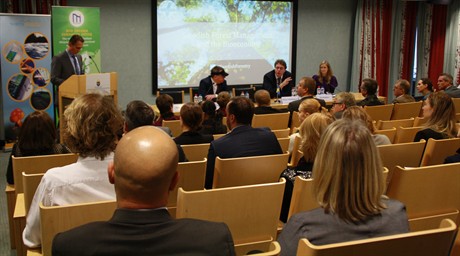
Forestry, Erik Bergkvist pointed out; makes a very important basic industry that creates support for people, possibilities for a sustainable development and a higher value for the whole of Europe. The bio based economy in Sweden is estimated to have a potential growth from 5 percent of the BNP today to 10-15 percent in 2050 and would in that case make up to between 50 and 100 billion EUR. This is mostly centered in the wood, building, bio-fuel and chemical areas and to some extent within the textile and compost industries. This will lead to a higher level of employment in Sweden and especially in the sparsely populated areas in Northern Sweden. To achieve the potential the industry is in need of long term regulations to be able to act and attract investors. Use diversification in the EU to build a strong Europe together, Erik Bergkvist urged.
Pierre Schellekens, Deputy Head Climate Commissioner at the Cabinet of Miguel Arias Canete for Climate and Energy gave an insight into the ongoing work with extra focus on the LULUCF directive and the RED II directive. Schellekens touched upon the new trading system for emission allowance (ETS) that the European Commission is working on to reach the EU commitments according to the Climate and Energy framework 2030 about for example 30 percent to reducethe CO2 emissions from sectors that are not today included in the EU trade system for emission allowances. The goals of the Climate and Energy framework 2030 constitute what EU has to do to fulfill their responsibilities in the Paris Agreement COP 21. The Climate and Energy framework states three main goals for 2030:
- At least 40% cuts in greenhouse gas emissions (from 1990 levels)
- At least 27% share for renewable energy
- At least 27% improvement in energy efficiency
The Climate and Energy framework are in line with the long term perspectives that are stated in the roadmap for a competitive economy with low CO2 emissions 2050, in the energy roadmap 2050 and in the white paper on the future of Europe concerning transport. The framework contains a binding goal to reduce the emissions within the EU territory with at least 40 percent below 1990 years level at latest 2030 which is also the EU goal according to the Paris agreement COP21. To reach the target of at least 40 percent in the EU it is required that:
- Sectors that are not included in the EU trading system for emission allowances will reduce their emissions with 43 percent (compared to 2005 levels). ETS will to achieve this reform and strengthen.
- Sectors that are not included by the ETS will reduce the emissions with 30 percent (compared to 2005 levels). For this to be successful this should be transformed into individually binding targets for the member states.
The LULUCF directive is important to reach the EU obligations of a decrease of 30 percent 2030 and so is also the EU trade system for emission allowances.
- The stronger ETS the stronger bio economy. We will not be able to achieve our goals within the energy sector without the use of biomass. Biomass has a fundamental role to play to accomplish the stated targets, said Pierre Schellekens.
Session 1: Sustainable Forest Management & Climate Change Mitigation
Anna Holmberg, Energy director at Skogsindustrierna, moderated session 1 about Sustainable Forest Management & Climate Change Mitigation
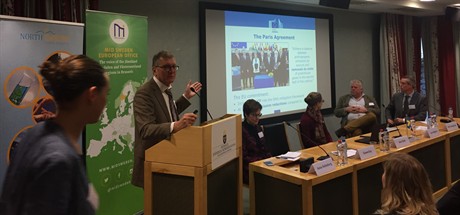
Simon Kay, Senior Policy Expert at DG CLIMA at the European Commission highlighted in his intervention the EU climate work and especially about the LULUCF directive that concerns emissions and the uptakeof greenhouse gas from land-use sectors that for today are not part of the EU trade system for emission allowances like forest and agriculture. A trialouge about LULUCF is ongoing and will probably reach an agreement in December 2017.
Sara Östh at Sveaskog spoke about forestry that is a well-planned high technological business and about different tools that Sveaskog uses to care for the nature. Lars Högbom at Skogforsk gave a picture of how forest can look like and his message were that forest products can be seen as coal neutral if the forest is wisely handled. The result varies depending on temporary system borders. Bror Sundqvist at Wood Center North/LTU held a presentation about sustainable supply of wood for the building sector and the society – “the Nordic way of living”. Jytte Guteland, member of the European parliament and the Committee on the Environment, Public Health and Food Safety attended the panel discussion that concluded the session with reflections on the previous interventions and an insight into her work at the European Parliament and the now currently discussed legal documents.
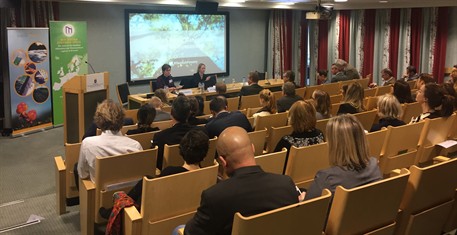
Session 2: The Bio economy - Forest raw materials contribution to the growth of the forest-based industries
Magnus Matisons, project leader in Bio economy at Biofuel Region, moderated session 2 'The Bio economy - Forest raw materials contribution to the growth of the forest-based industries'.
Tapio Kytölä at DG RTD at the European Commission spoke about the present review of the bio economic strategy from 2012. In the European Commission a total of 10 Directorate Generals are participating in the extensive revise work that includes inspection of for example criteria for sustainability, the circular economy package and COP21 before the new strategy is presented in the fall of 2018. The EU Member States are positive to the Bio economy as a possibility to start new working opportunities and economic growth and most of them plan to build forward their own national strategies. Furthermore Tapio Kytölä spoke about actions within the EU to strengthen the bio economy for example through Horizon 2020 and the Joint Undertaking for bio based industries initiative that has access to over 3, 8 billion EUR for the period of 2014-2020. EIB has since 2012 trippledtheir investments in circular economy and the bio economy.
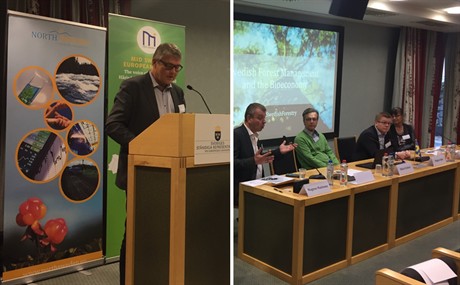
Rikard Gebart at LTU brought forward the importance of bioenergy for the Swedish energy system and pointed out that the biomass for the energy production come from waste from the forestry and the forest based industries. As for the transportation Gebarts main point were that biofuel will be important if we plan for the sector to be fossil free. Magnus Edin at SunPine that produce bio diesel from Pine Oil and Ylwa Alwarsdotter at SEKAB that develop technology that makes research to produce commercial ethanol products from cellulose and refining ethanol into renewable fuels and green chemicals, agreed with the other panelists about the worries concerning the vote about RED II in the environmental committee. This proposes a 0 percent production of biodiesel from pine oil.
- The proposal from the EU-commission concerning RED II for advanced bio fuels is ambitious and viable. Our message is to keep annex IX part A unchanged, include new raw materials and to delete none of the existing ones, Ylwa and Magnus said in unison.
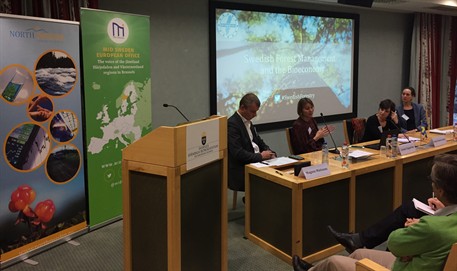
Linnea Engström, member of the European Parliament, Fanny Pomme-Langue at AEBIOM and Linde Zuidema at FERN took part in the second panel discussion concerning the bio based economy and the RED II directive, the proposed legislation to revise the Renewable Energy Directive and the definition of advanced bio fuel.
The seminar ended with a Q&A-session. The seminar gathered 80 participants from the public sector and industry in Northern Sweden, the European institutions, different branch of industries and regional offices in Brussels.
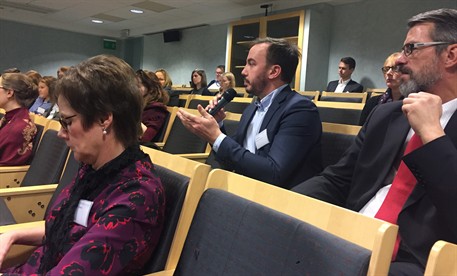
The seminar was arranged by North Sweden European Office.
RED II – The committee for industry, research and energy took position the 28th of November
During the day the Committee for Industry, research and energy adopted position about RED II in the European Parliament. In their position the committee chooses to keep the already existing definition of advanced bio fuels as the proposition from the EU-commission proposed. They also vote for the definition to be expanded to cover more. The European Parliament will probably decide their position about RED II in January or February 2018.
Presentations
Europaforum Northern Sweden
Europaforum Northern Sweden (EFNS) is a network for politicians at local and regional level from Norrbotten, Västerbotten, Jämtland and Västernorrland. EFNS is a meeting point and a knowledge platform where the politics of the EU are analyzed and discussed in the parts where it affects Northern Sweden. EFNS monitor European issues to have an impact on EU legislation.
/Mona Mansour
